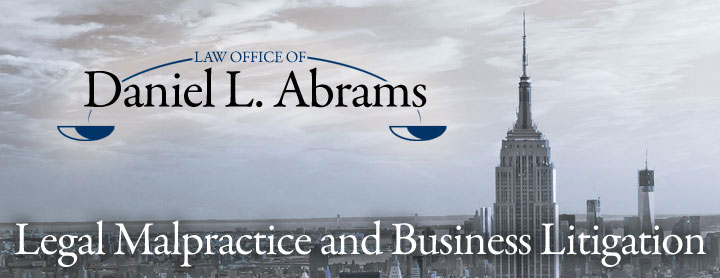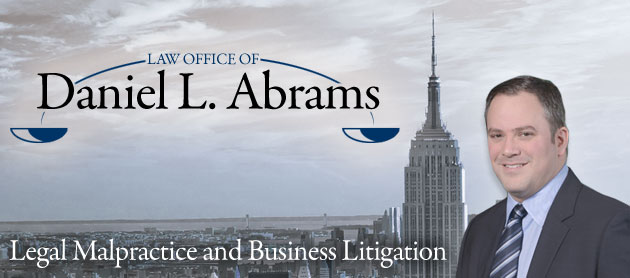We have received many phone calls from people interested in pursuing a legal malpractice case against their attorneys. Here are the most common questions and answers:
How do I prove legal malpractice?
A legal malpractice case in New York requires:
- an attorney-client relationship,
- an attorney’s negligence in the handling of a client matter, and
- the attorney’s negligence proximately caused the client to incur actual and ascertainable damages.
I can prove each element of legal malpractice. Should I bring a case?
Not necessarily. Legal malpractice cases are very expensive to prosecute, as attorneys ordinarily dig in and fight, and insurance companies are usually content to let the litigation proceed for a long time (often up to trial and occasionally beyond trial) before offering a fair settlement. There must be a lot of money at stake before embarking on a legal malpractice case.
While there are no hard and fast rules, I would ordinarily caution against bringing a legal malpractice case unless there were damages well into the six figures.
Another potential problem to understand before bringing a legal malpractice case is the fact that many attorneys lack professional liability insurance. These are often the same attorneys who make themselves “judgment proof” by putting their assets in a spouse’s name or making other perfectly legal maneuvers. Most verdicts are meaningless without financial recovery, so the availability of insurance or other means of recovery should be considered as early as possible.
My attorney made several mistakes during the representation. How can I tell whether or not the mistakes constitute professional negligence?
Not every perceived mistake will support a legal malpractice case. Lawyers are duty-bound to exercise the competence and diligence that is normally exercised by attorneys in similar circumstances. Lawyers are entitled, however, to a certain amount of judgmental deference, meaning that strategic decisions that look like mistakes only with the benefit of hindsight will not support a legal malpractice case.
The clearest legal malpractice cases are ones where the attorney has failed to undertake a clear duty, such as missing a statute of limitations or court deadline. Legal malpractice becomes much more difficult to prove where the attorney can justify his actions as being strategic in nature.
What are my legal malpractice damages?
Generally speaking, a plaintiff must show that he or she would be in a different financial position if the legal malpractice had not taken place. Non-financial damages like pain and suffering are not recoverable. The measure of damages is the difference between (1) where the plaintiff should be had the legal malpractice not occurred, and (2) where the plaintiff is as a result of the malpractice. Where the underlying legal matter was a litigation, this means that the plaintiff must not only prove malpractice, but also that the result of the litigation would have been different if the attorney had not committed legal malpractice. Therefore, the legal malpractice plaintiff often must prove two cases: the legal malpractice case and the underlying case. This is one of the reasons why legal malpractice cases are typically expensive and difficult to prove.
My lawyer stopped returning my phone calls (or e-mails). Does this constitute legal malpractice?
No. While attorneys are ethically bound to communicate with clients and keep clients abreast of important developments, a simple failure to keep in touch will not support a legal malpractice case, unless the lack of communication actually causes a client to suffer damage. If your complaint about your attorney is primarily about lack of communication, you may be entitled to a partial refund for fees paid, and you may want to consider filing an ethical complaint with the appropriate disciplinary committee.
My lawyer has overbilled me. Do I have a legal malpractice case?
Not necessarily. Lawyers can and often do overbill their clients while exercising proper care in the performance of their duties in the underlying case. Some attorneys overbill clients by spending excessive amounts of time on each and every conceivable issue. Legal malpractice usually arises from the opposite problem, which is neglect. Occasionally, a lawyer will manage to both overbill their client and commit legal malpractice.
I have filed a complaint with the disciplinary committee. Should I wait until my complaint is processed before bringing my legal malpractice case?
Absolutely not! The disciplinary committees do valuable work, but most of them will not consider the merits of a legal malpractice case. Nor can they provide you with a penny of recovery. If you have a potential legal malpractice case, consult with an attorney as soon as possible to make sure that you file your case well in advance of the expiration of any applicable statutes of limitation.
I am interested in contacting your firm about a potential legal malpractice case. Is there any cost to me?
An initial phone consultation to discuss the possibility of representation is free. The purpose of any such consultation is to determine whether or not we can work together in pursuing your case. We provide no legal advice in such phone calls. We charge a flat fee payable in advance for an in-person office consultation.
How does your firm charge for services?
We offer hourly rates — presently $700 an hour — for Mr. Abrams’ time, with lower rates for other individuals, if any, who work on the case. We also offer lower hourly rates combined with a partial contingency where the case appears to be strong, and where:
- the amount of damages are over $500,000;
- the defendants have professional liability insurance or other reachable assets; and
- the client prefers a partial contingency arrangement with reduced hourly rates or is unable to pursue the case on an hourly basis








